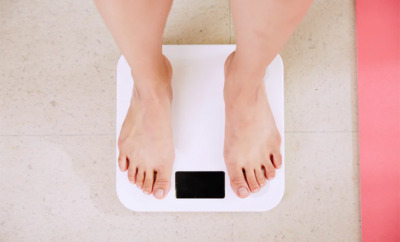What to Know About Hypothyroidism: 3 Ways to Support Your Thyroid + Improve Energy Levels

One of the key, yet often overlooked factors in optimal energy levels, is a properly functioning thyroid. The thyroid is a butterfly-shaped gland located at the base of the neck, just below the Adam’s apple.
The thyroid creates and secretes hormones to help control many functions of the body, such as influencing metabolism, growth and development, and temperature. When the thyroid isn’t producing and secreting enough thyroid hormones, hypothyroidism is the result.
Hypothyroidism is simply a thyroid that is under-active. Meaning, the thyroid can’t meet the demands of the body.
There are thyroid receptors in virtually every area of the body, which leads to the wide variety of symptoms that can present. The thyroid works like a thermostat in the body; even the slightest change can have a major impact on the whole house.
Signs of hypothyroidism include low energy levels, constipation, intolerance to cold, weight gain, general weakness, depression, menstrual irregularities, brittle hair and nails, infertility, and decreased cardiovascular function.
How Common Is Hypothyroidism?
Hypothyroidism commonly occurs in 1 in 300 people in the United States.
With that said, there is also subclinical hypothyroidism, which means it’s not quite under-active enough to be considered clinical hypothyroidism, but harms the body and diminishes energy levels.
Hypothyroidism can occur at any age, although it most commonly occurs between 30-50 years of age.
Therefore, the amount of people with thyroid dysfunction is more common than 1 in 300.
There are also different types of hypothyroidism, with autoimmune thyroid disease (Hashimoto’s), being the most common.
7 Signs You May Be Suffering from an Autoimmune Condition (From an Integrative Doctor)
Hypothyroidism can occur at any age, although it most commonly occurs between 30-50 years of age, and occurs more frequently in women.
Here Are 3 Ways to Support Your Thyroid and Improve Energy Levels:
1. Limit Goitrogens in Your Diet
Goitrogens are a substance that interferes with iodine metabolism, which leads to a reduction of thyroid hormone production. Iodine is one of the building blocks of thyroid hormones. Decreased iodine = decreased thyroid hormones.
Common Foods That Contain Goitrogens:
- Broccoli
- Cauliflower
- Cabbage
- Spinach
- Kale
- Brussel sprouts
- Soy
Here’s an expanded list of dietary goitrogens. Cooking on higher heat may destroy goitrogenic activity in these foods.
With that said, all of these foods contain a lot of nutrients and can be supportive of overall health.
It’s not advised to never eat these foods again. Instead, if you eat a ton of some of these, swap it out with other nutrient-dense vegetables. When you do eat them, opt for a cooked version whenever possible!
2. Supplementation of Thyroid-Supporting Nutrients
Selenium helps protect thyroid cells from being damaged. The thyroid has the largest concentration of selenium in the body and supplement has shown improvement in hypothyroidism.
It’s important to note selenium is one of the micronutrients that is depleted by hormonal birth control.
If you are or have been on hormonal birth control, your selenium levels may be low! Brazil nuts are the highest selenium containing food (6-8 nuts contain 544 micrograms).
Zinc also plays a role in optimal thyroid function. Zinc is required for the conversion of the thyroid hormone (T4) into another thyroid hormone (T3).
If you prefer to get your zinc from dietary sources, be sure to incorporate high zinc-containing foods, such as beef, oysters, beans, pumpkin seeds, chicken, and cashews.
Iodine is required for the production of T3 and T4. However, only 400mcg per day is required.
It can be harmful to consume too much iodine. If you consume iodized salt, you’re most likely getting enough! You can also get iodine through the consumption of cod, tuna, seaweed, and other seafood.
It’s important to always consume supplements in the most bioavailable (easily absorbable form).
It’s also essential to consume them in adequate dosages. Too little may not have a therapeutic effect and too much can cause harm. It’s best to work with a healthcare provider to find the right dose for you!
3. Come Back to the Basics
The thyroid gland is part of a larger system called the endocrine system. The endocrine system is a network of glands that secrete hormones to regulate most of your body’s processes, such as metabolism, growth, digestion, and energy levels.
Simply put, your hormones are chemical messengers that tell your body what to do and when to do it. If your hormones are out of balance, as occurring with an under-active thyroid, several bodily functions can slow way down.
This is why constipation, weight gain, and fatigue are commonly reported with hypothyroidism.
Your hormones are chemical messengers that tell your body what to do and when to do it.
Coming back to the basics and focusing on the foundations of health are key for supporting your hormonal health and boosting energy levels.
The Basic Foundations of Health:
- Get seven to eight hours of uninterrupted sleep per night
- Eat a nutrient-dense diet and drink 2L of water per day
- Limit your alcohol and sugar intake
- Move 20-30 minutes every day at a moderate intensity (high-intensity exercise is not ideal for hormonal health)
- Stress management (yoga, guided meditations, or deep breathing techniques are very effective)
In Conclusion: Healthy Thyroid = Happy Life
If you suspect you might have hypothyroidism, reach out to your healthcare provider and inquire about getting your serum TSH and free T4 levels tested.
With that said, TSH levels don’t always tell the whole story. Therefore, it could be helpful to see an Endocrinologist or a Naturopathic Doctor for more comprehensive lab work. Although there are a variety of holistic things you can do naturally to support the thyroid, sometimes pharmaceuticals are needed to obtain an optimal state.
Diagnosed With an Autoimmune Disease? This Integrative Doctor Explains What to Do Next
The daily choices we make have a profound impact on hormones, energy levels and overall health.
If you’re looking to support your thyroid, make sure to reduce intake of goitrogen-containing foods, ensure adequate supporting nutrients, and focus on the foundations of health! Show your thyroid some love and take the best possible care of your sweet self! Because when you feel well, everything seems possible.
All included information is not intended to treat or diagnose. The views expressed are those of the author and should be attributed solely to the author. For medical questions, please consult your healthcare provider.


This Month's Letter
From the Editor
Monthly motivation and food for
thought from our founder.






























Comments